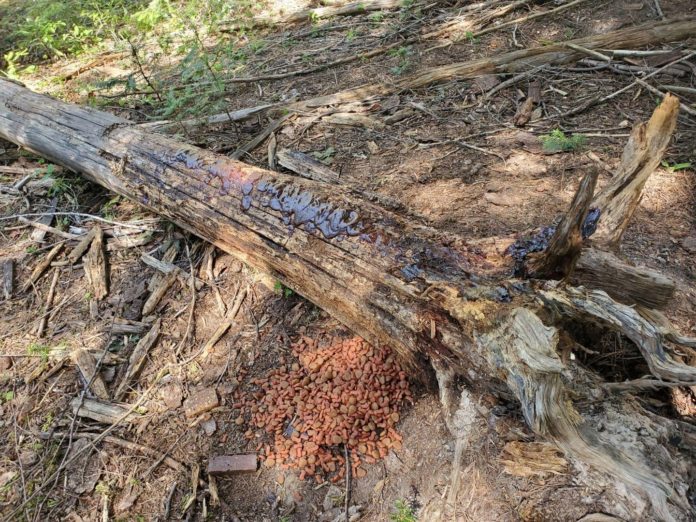After a year-long investigation by Montana Fish, Wildlife and Parks, a northwest Montana man pled guilty to nine misdemeanor hunting violations on Oct. 18, 2021. The charges against Alfred “Toby” Bridges of Sanders County included the unlawful hunting of black bears over bait and killing an elk out of season, according to MFWP.
The investigation by game warden Morgan Post and MFWP investigator Tom Chianelli focused on the unlawful hunting of black bears over bait, a practice that’s illegal in Montana. Bridges used “a variety of human foods, including barbecue sauce, to bait bears” in his hunting area.
During the investigation, law enforcement also discovered additional hunting violations. The charges to which Bridges pled guilty last fall include: two counts of killing black bears over bait, two counts of unlawful possession of those two black bears, one count of killing a cow elk after the general elk season ended, one count of unlawful possession of that elk, one count of loan and transfer of a license for a whitetail buck he shot using another individual’s license, one count of taking an overlimit for the buck since he had already shot a buck during the 2020 general hunting season, and one count of unlawful possession of that buck.
Bridges pled not guilty to two additional charges related to a third black bear shot over bait, but failed to appear in court on Dec. 15 for a pre-trial hearing, according to Sanders County Justice Court clerk and restitution officer Carl Marquardt. This resulted in two arrest warrants for failure to appear. Personal Facebook posts indicate Bridges was preparing to move in early November and packed his belongings in late November to return to the Midwest.
The nine misdemeanor convictions led to fines and restitution totaling $9,605, plus the loss of Bridges’ hunting, fishing, and trapping privileges for 54 months. Although Bridges paid most of the $9,605, he still owes $305 as of March 11. That resulted in a third arrest warrant, for failure to pay.
The Sanders County Justice Court has limited jurisdiction, according to Marquardt, and these three warrants are non-extraditable outside the state of Montana. In other words, law enforcement in other states cannot act on these warrants to arrest Bridges or return him to Montana to face the outstanding charges.
According to a Feb. 1 blog post, Bridges was searching for a new home in northern Arkansas or southern Missouri. He wrote that he “signed a purchase agreement on a small cabin close to large tracts of National Forest” due to its “hundreds of miles of clear running creeks and rivers … numerous wildlife/conservation areas … many miles of hiking trails … numerous places to shoot …” In a Facebook post published one day after pleading guilty to the misdemeanor charges, Bridges wrote, “Please do not worry about me ‘Not Having Places To Hunt’ when I head back to the Midwest. … I will actually get in a lot more hunting than I have since making the move to Montana. One thing is for certain … there in the heart of the Midwest, I have a lot more quality private land to hunt than I have while living amongst the Rockies.”
There are healthy black bear populations and bear seasons in both states. Montana is a member of the Interstate Wildlife Violator Compact, however, so Bridges will not be able to legally hunt black bears nor purchase hunting licenses in all 47 member states (which include Arkansas and Missouri) for at least four years.
Bridges is a former guide, employee of Knight Rifles, and outdoor writer who has published work with several publications, including one bylined story for Outdoor Life, which has since been unpublished. His blog, North American Muzzleloader Hunting, has been active since 2004 according to the page’s Facebook group, which has nearly 4,000 followers.
Although MFWP Region 1 communication and education program manager Dillon Tabish did not confirm whether tips from the statewide poaching hotline aided investigators in this particular case, he encourages hunters and other residents to continue to call in potential hunting and wildlife violations.
“That always really helps us crack down on these situations,” says Tabish. “That’s always a beneficial tool for hunters. For example, even in the past 24 hours since this news release has been out, we’ve received a lot of [unrelated] calls to the tip line. We really appreciate hunters trying to stop these poachers.”


